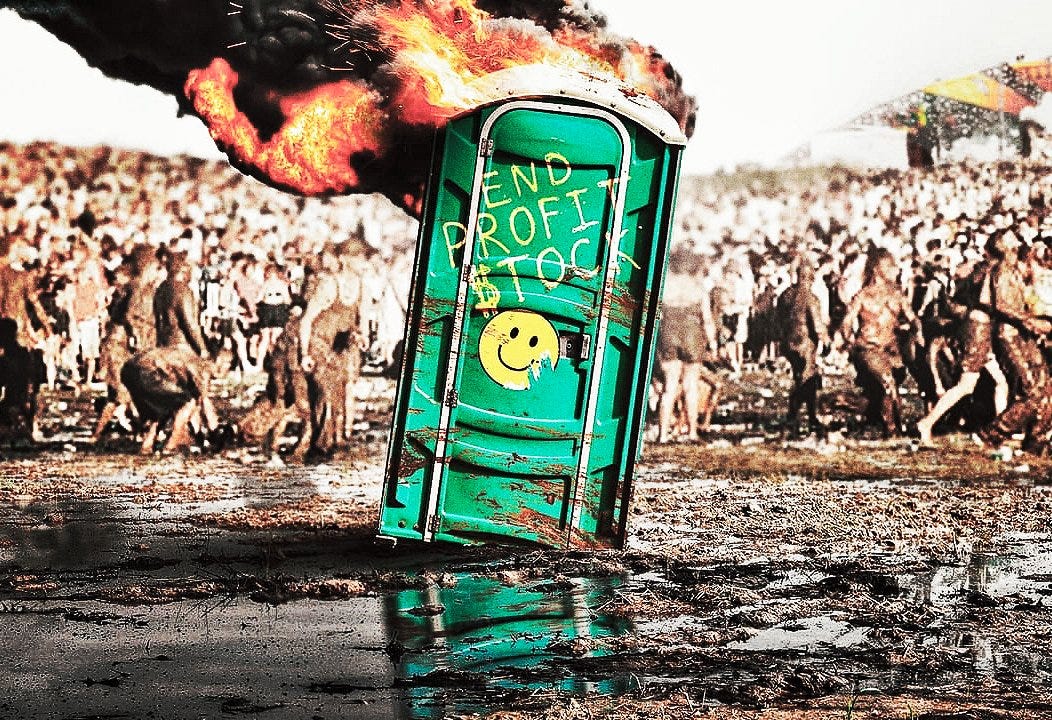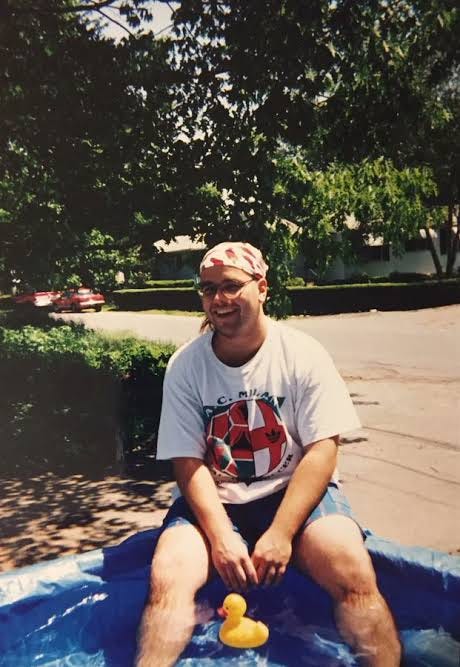Netflix’s new documentary Trainwreck: Woodstock 99 is bound to get people talking, but is it actually worth the watch?
Trainwreck: Woodstock 99, as you’d expect, covers the story of one of the literally shittiest (we’ll get to that) festivals in history. From July 22 to July 25, 1999 about 200,000 people descended on an old air force base in New York to watch and listen to very bad music by the likes of Limp Bizkit, Creed, Insane Clown Posse and Kid Rock and some good music from like Rage Against The Machine and uhhh Willie Nelson.
The jokes write themselves but the reality of what happened over that weekend is deeply depressing. So much so, that Trainwreck is the second documentary on the festival and there is also an eight-episode podcast about it.
Three people died, there were multiple rapes and sexual assaults and acts of violence, thousands of people had to be treated in an overwhelmed make-shift hospital for heat stroke and injuries, there was human shit everywhere and people were dancing in it, people got trench mouth from the contaminated drinking water, on the last day people rioted, destroyed and stole property, and set fire to a bunch of tents, container trucks, cars and gear.
So let’s get down to it. Is it worth watching Trainwreck or not?
The good
Well, it’s thorough. There are three 45 minute episodes.
It’s also about as subtle as a brick so if you’re tired, you don’t have to think. Everything is force-fed. For example, when the promoters are talking, the camera pans to a kid lying in the grass wearing a cap that says “liar”. When Jewel is singing “Only Kindness Matters” they show people throwing bottles at her. It is a bit of a brain rest to be told what to think.
The late Woodstock organiser Michael Lang is so delusional it does make for astounding television. Hearing him say people ripping down a wall were doing it because they wanted to take home bits as a souvenir and that people started rioting because “they didn’t want the night to end” is just really incredible.
The bad
It’s just all too basic. Trainwreck wants to provide so many angles on what might have gone wrong that weekend that they oversimplify everything and never really dig into the causes of the chaos.
At one point they even share the theory that promoters intentionally let the weekend devolve into a nightmare to *checks notes* sell merch?
The job of a documentarian is not to share every wild theory. It’s to pick the most sensible and dig as deep as you can.
In trying to wrap up the last episode with a bow, they have the same entitled, wealthy, white kids saying “It was the best time I’ve ever had” and “I’m glad I got to experience that” which is so tantilasingly close to “the point” AKA what went wrong that it’s painful to watch.
The fact that young men can say a weekend where potentially thousands of women were sexually assaulted was “the best time I’ve ever had”…
The fact that promoters and capitalists can declare a weekend “a success” at a press conference knowing people have been sexually assaulted and knowing people would have been injured….
The fact that we can watch Anthony Kiedis and the rest of the Red Hot Chili Peppers climb into a white limo after putting thousands of lives at risk and face zero consequences for that…
…doesn’t all of that speak to something sick and wrong about the way we are and how we treat each other?
Yet, it’s all left unsaid. Instead there’s empty moralising that we’re in better times. “We don’t accept what happened anymore” and “we learned who we don’t want to be” is just meaningless because it’s not true.
The ugly
Trainwreck’s biggest failure is just how exploitative it is. The choice to show the sexual assault of women with close ups on their faces during the documentary is revolting and unforgiveable.
I don’t even need to look it up to know the director or film editors are men.
You can absolutely talk about sexual violence without showing sexual violence. The way sexual assault is treated throughout the entire series is appalling.
These women, repeatedly shown near-naked and being assaulted are likely my age, with children. Some will undoubtedly be retraumatised by the decision to show graphic images of their sexual assaults on one of the largest streaming platforms in he world.
The only person who shows any emotion while talking about the rapes and sexual violence of that weekend is the lone woman interviewed who worked for the promoters. Rape and sexual violence is treated as just one more bad thing that happened over that weekend. Move on. Anymore popcorn?
The breathless recounting of a rape in the rave tent of a child was a real story, yet it was treated as little more than a shocking anecdote to confront Fat Boy Slim with.
Oneida County and Michael Lang were sued for personal injury over sexual assault at the festival, the trauma these women went through is long-lasting and should have been treated with more respect than this documentary gave them.
*
Finally, it was always going to be a tough watch for me. A year and a half after Woodstock 99, my friend Jess died in the mosh during Limp Bizkit’s performance at the Big Day Out.
I’ve written about how devastating this was for her family and friends. It continues to be devastating for us all.
I was 15. She’d just turned 16 on the 7th of January and the machine keeping her alive was turned off on the 31st of January.
Fred Durst repeating what he would say just a year and a half later after Jess was crushed to death “it’s not my fault” was a new heartache for already broken hearts.
What I loathed most about the documentary was the erasure of those who died due to the actions of so many that weekend. What was not said was this:
David G. Derosia was 24 and he died.
In the far superior Woodstock 99 documentary Peace, Love and Rage documentary on Neon, David’s friends and family lovingly talk about him. He is brought back to a kind of life in their words and we begin to grapple with what has been lost. His journal from the weekend is shared with the audience, you understand, just a tiny bit, the pain that losing him caused so many.
In the Woodstock 99 podcast Break Stuff they do the same. “[David] radiates an inherent kindness, the kind of feeling you hope you get from a neighbor or coworker.” They share how David was caregiver for his mum Lorelei.
“If I needed help doing anything, he would help me,” Lorelei says. “He would help me do things in the yard. He would take me to doctors appointments. He is just an amazing kid.”
His last words out the door were: ‘You worry too much, Mom. I’ll be all right’.
When we turn the lives of real people into empty and shallow infotainment for streaming services we’re losing something really important. I can’t articulate it, but the endless true crime documentaries and podcasts that turn personal nightmares into public comedy dramas - I just loathe them.
I hate that the lives of David and Tara K. Weaver, 28, are not even mentioned in the documentary and I can’t help but think it’s simply because they didn’t fit in with the narrative being presented. And that’s why this documentary left such a bad taste in my mouth and an ache in my chest.
They’re pushing a story that’s just too simplified. And there’s simply too much at stake to keep doing that.
So, is it worth the watch?
In my opinion? Nah. Skip it and watch Peace, Love and Rage on Neon or listen to the Break Stuff podcast.






Not naming the people who died reduces them to meaningless statistics :(
Thanks for this - was wavering over whether or not to watch it, but this made the decision easier. My partner and I will find better uses of our precious TV-watching time.